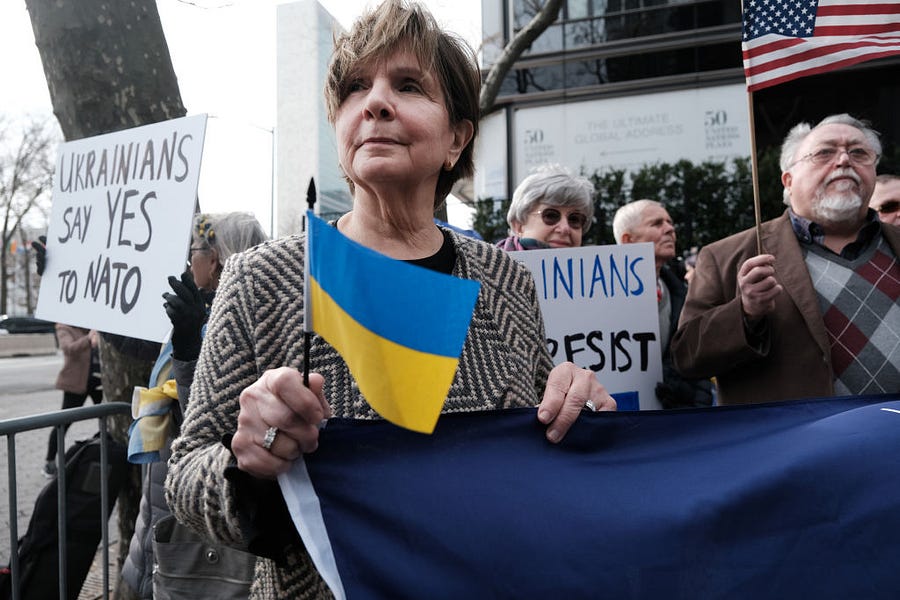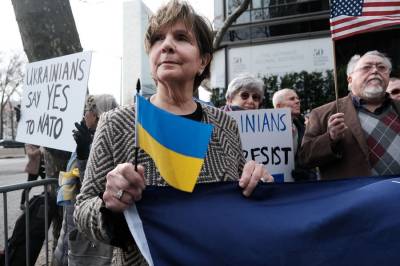Earlier today, at the end of a conference hosted by Redeemer Presbyterian Church in San Antonio, I was asked an interesting question—one I’ve never been asked at a Christian conference before. “What are you specifically praying for, today?” My answer was immediate: “I’m praying that God turns Vladimir Putin’s heart from war.”
I tried to explain why that was front of mind in pragmatic terms. A great power invasion of Russia’s European neighbor would not only be an humanitarian crisis in its own right, it could lead to a series of destabilizing events that would reopen the dark chapters of world history. Historians may look back at this era as the era when we lost the peace, when a new Cold War emerged and sowed the seeds for devastating conflict.
But there’s something else at work here, something beyond pragmatism. As we confront the crisis in Ukraine, it helps us understand patriotism itself—how a healthy patriotism extends our sphere of concern, and how an unhealthy nationalism restricts us and narrows our focus, leaving us often indifferent to the suffering of others.
For an example of the latter view, I’d invite you to watch the following exchange, between former Donald Trump chief strategist Steve Bannon and Ohio Republican Senate candidate J.D. Vance, where Vance bluntly says, “I gotta be honest, I don’t really care what happens to Ukraine one way or the other” and immediately pivots to talking about problems here at home:
I am not sharing this clip to argue that problems at home don’t matter. They do! And the fentanyl crisis (which Vance mentions next) merits allocating immense resources to combat. Americans are dying deaths of despair by the tens of thousands. It’s an urgent national crisis.
But there is also a serious geopolitical challenge unfolding in Europe and a deep moral injury threatening Ukraine. And it demands our attention as well, and not just in strategic terms. The moral dimension should weigh on us all. Indeed, moral injuries can cut the deepest and leave the most bitter legacies. Moral concern can and should bind us together, out of empathy for profound loss.
To understand how a healthy patriotism can lead to solidarity with and empathy for others, it’s worth returning to perhaps the most helpful framing of the virtues of patriotism and the temptations of nationalism that I’ve ever read. In his book The Four Loves, C.S. Lewis outlines the ways in which citizens should love their nations.
First, he uses a key word—“home.” He compares the love of your country to the “love of home, of the place we grew up in or the places, perhaps many, which have been our homes; and of all places fairly near these and fairly like them; love of old acquaintances, of familiar sights, sounds and smells.”
When I read those words, I know instantly what Lewis is talking about. If you’ve ever traveled abroad for any length of time, you might remember that feeling of comfort the moment you return. It’s akin to that sense of comfort you feel when you open your front door and walk into your own house. This is where I am from. This is where I belong.
But he continues, explaining how this feeling of national belonging can be an expression of selflessness. “As the family offers us the first step beyond self-love,” writes Lewis, “so this offers us the first step beyond family selfishness.”
Critically, love of country rooted in love of home “is not in the least aggressive.” It “asks only to be let alone.” That’s not to say that it’s pacifistic, but “it becomes militant only to protect what it loves.”
And here’s the final element. Because healthy patriotism is rooted in this deep and natural sense of home, it rebukes any sense of chauvinism or xenophobia. “In any mind which has a pennyworth of imagination it produces a good attitude towards foreigners,” Lewis says, “How can I love my home without coming to realise that other men, no less rightly, love theirs.”
It is this sense of peace and place that echoes in the prophet Micah’s words: “Everyone will sit under their own vine and under their own fig tree, and no one will make them afraid.” These words have deep meaning, both within and among our national homes.
In fact, the “good attitude towards foreigners” can cause us to keenly feel their pain in the face of tragedy or attack. I remember being deeply moved when I saw the headline of the French newspaper Le Monde on September 12, 2001. Nous sommes tous américains, it read. “We are all Americans.”
I can also remember watching when Queen Elizabeth ordered the playing of the Star Spangled Banner after 9/11. The moment still carries great weight:
“Yes,” you might say, “but we have deep ties to Britain and France, ties that we don’t have with Ukraine.” American troops have bled on French soil in two world wars. We’re treaty allies.
I fully acknowledge that the tangible bonds of both past and present create in citizens of each country a more visceral and emotional tie to each other, but those moments still illustrate a deep truth—our own patriotism can help us understand another nation’s loss.
And this turns us to Ukraine. The Ukrainian people are a suffering people, swallowed for generations by the Russian Empire and by the Soviet Union. It endured the Holodomor, the Soviet terror-famine that killed millions. Part of it is presently occupied, and it’s been fighting with Russian-backed separatists for most of a decade.
No one claims that Ukraine is a perfect country. Like many former Soviet republics, it has struggled to find its footing. It’s endured authoritarianism, and it battles corruption. But, in Lewis’s words, it is “not in the least aggressive.” It “asks only to be let alone.” As a nation that has endured its own aggressive attacks, how can we not empathize? How can we not do what we reasonably can to deter Russian aggression and help Ukrainians defend themselves?
Note that I did not say “defend Ukraine.” Our concern for others does not lead to unlimited military obligations. No nation, not even one as strong as ours, could bear that cost.
But this moment should cast our existing obligations in a different light, reaffirming their immense value. In fact, it is our understanding of the value of our national home—and the deeply destabilizing and violent pain of the loss of others’ national homes—that leads to the network of defensive alliances that has maintained great power peace for so long.
NATO is not “American imperialism.” Our defensive alliances in Asia aren’t the result of “imperial overreach.” To continue the comparison to home, a defensive alliance is akin to a neighborhood watch, where neighbors look after and protect each other. It is to our nation’s credit that we did not turn decisively inward after World War II, that we did not repeat the mistakes of the past and left our friends and allies to fend for themselves.
It is no coincidence, however, that the unhealthy nationalism of the modern incarnation of America First does seek to repeat those past mistakes. And the reason isn’t just tactical or strategic, it’s philosophical—rooted in temptations and vices that Lewis warns against in the Four Loves.
Essentially, the warning is against a sense of superiority—about both the past and present. As Lewis said, a love of country can lead to a “particular attitude to our country’s past” that has “not quite such good credentials as the sheer love of home.”
Why is that dangerous? Why is it so important to understand history in full? “The actual history of every country is full of shabby and even shameful doings … The heroic stories,” Lewis writes, “if taken to be typical, give a false impression of it and are often themselves open to serious historical criticism.”
At worst we can hold the “firm, even prosaic belief that our own nation, in sober fact, has long been, and still is markedly superior to all others.” This belief “can produce asses that kick and bite.” “On the lunatic fringe,” Lewis warned, “It may shade off into that popular Racialism which Christianity and science equally forbid.”
Interestingly enough, the sense of superiority can create the same outcome as the sense of national self-loathing you sometimes see on far-left and far-right. The chauvinist has no concern beyond our borders. The angry critic says we have no right to demonstrate concern, so long as we are still so flawed. The motivations are different, but the result is similar—an insular people, focused on themselves.
I don’t know what will happen next. By the time you read this newsletter, Russian forces may already be crossing the border. Or perhaps Putin blinks. Perhaps the Russians declare victory and stand down, and a free Ukraine lives another day.
For now, however, we stand on the precipice of a great tragedy—one that would present a tremendous geopolitical risk, but would also constitute a terrible moral crime. A criminal regime is on the verge of kicking down the door of a national home, and our nation should stand with the innocent, with those who wish to be left alone. We are all Ukrainians now.
One more thing …
In this week’s Good Faith podcast, Curtis and I try to answer the question, “What the heck is a Christian nationalist?” Is there an academic or theological definition? Or is it more of an emotional or visceral phenomenon?
My favorite part of the podcast is when we started talking about some of the things we love about this flawed national home of ours and when Curtis tells the story of his family’s journey to America. Listen to the whole thing. I think you’ll like it.
One last thing …
As the world waits to see if the storm of war is unleashed in a way that we haven’t seen in generations, I thought of Psalm 46—and this hymn—which should remind us that God is sovereign, in war and peace:







Please note that we at The Dispatch hold ourselves, our work, and our commenters to a higher standard than other places on the internet. We welcome comments that foster genuine debate or discussion—including comments critical of us or our work—but responses that include ad hominem attacks on fellow Dispatch members or are intended to stoke fear and anger may be moderated.
With your membership, you only have the ability to comment on The Morning Dispatch articles. Consider upgrading to join the conversation everywhere.